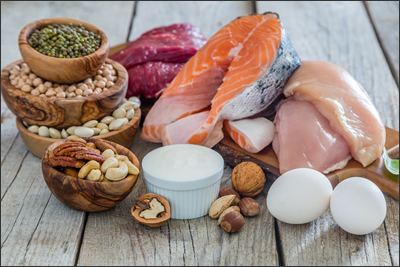How To Achieve Long-Term Fat Loss

Losing fat for the long term can be a challenging task. But regardless of the type of diet that you are on, there are a number of things that you can do to improve your chances of burning off that fat for good.
Here are several factors that can assist with that goal. Now, you may be doing some of these already or find that some don't suit your lifestyle. But, just adding a few of these can assist you with achieving your desired end result.
Start strength training
Strength training is a type of exercise in which your muscles contract against resistance. It builds muscle mass and increases strength over time, and it usually involves lifting weights.
Doing bodyweight exercises, lifting weights, and using gym equipment are a few easy ways to get started with strength training.
Strength training may not only help decrease your body fat levels but also increase resting energy expenditure and target belly fat.
Follow a high protein diet
Eating more protein-rich foods can help reduce your appetite and increase fat burning.
In fact, multiple studies have associated eating more high quality protein with a lower risk of excess body fat and obesity.
Try adding a few servings of high protein food to your diet each day. Protein-rich foods include meat, seafood, eggs, legumes, tofu, and dairy products like milk, cheese, and yogurt.
Get more sleep
Going to bed a bit earlier or setting your alarm clock a little later is a simple strategy to help you reach and maintain a healthy weight.
Recent research indicates that a lack of sleep may contribute to alterations in hunger hormones, increased appetite, and a higher risk of obesity.
Although everyone needs a different amount of sleep, most studies tie at least 7 hours of sleep per night to the most benefits for weight management and overall health. To support a healthy sleep cycle, stick to a regular sleep schedule, limit your intake of caffeine in the evening, and minimize your use of electronic devices before bed.
Eat more healthy fats
Although it may seem counterintuitive, increasing your intake of healthy fats may prevent weight gain.
A 12-month study associated following a Mediterranean diet rich in healthy fats from olive oil and nuts with greater long-term weight loss, compared with a low fat diet. Another review linked diets enriched with olive oil to greater reductions in body weight and belly fat compared with diets without olive oil.
Olive oil, coconut oil, avocados, nuts, and seeds are just a few examples of nutritious fats that can benefit your health.
Drink unsweetened beverages
Swapping out sugary drinks for healthier selections is one of the easiest ways to promote long-term, sustainable fat loss.
By now most people know that sugar is the worst culprit for increasing your body's fat content. But you have to be aware of all types of sugary drinks, including fruit juice, which is packed with sugar. It's not just the fizzy, sugary drinks that are the issue.
Instead, opt for calorie-free beverages like water or green tea.
And don't drink chemically sweetened drinks as these have their own issues.
Add probiotics to your diet
Probiotics are a type of beneficial bacteria found in your digestive tract. In fact, these bacteria have been shown to play a role in everything from immunity to mental health.
Increasing your intake of probiotics through either food or supplements can also rev up fat burning and support long-term weight management.
Certain strains of probiotics in the genus Lactobacillus may be especially effective at aiding weight and fat loss.
Taking supplements is a simple, convenient way to get in a concentrated dose of probiotics every day. Alternatively, you can eat probiotic-rich foods like kefir, tempeh, natto, kombucha, kimchi, and sauerkraut.
Drink coffee
The caffeine in coffee stimulates your central nervous system, increases metabolism, and boosts the breakdown of fatty acids. Caffeine has also been shown to enhance fat burning during aerobic exercise, particularly for those who are untrained or sedentary.
To maximize the health benefits of coffee, avoid adding large amounts of cream and sugar. Instead, enjoy it black or with a small splash of milk and an alternative sweetener (not chemical) like stevia, monk fruit or xylitol.
Increase your cardio
Cardio, also known as aerobic exercise, is one of the most common forms of exercise. It’s any type of exercise that specifically trains the heart and lungs. Adding cardio to your routine may be one of the most effective ways to enhance fat burning and weight loss.
Most research recommends 20-40 minutes of moderate to vigorous exercise per day. Running, walking, cycling, and swimming are just a few examples of cardio workouts.
Studies show that the more aerobic exercise people get, the more body fat they tend to lose. Cardio may also help reduce waist circumference and increase muscle mass.
Increase fibre intake
Soluble fiber - which is found in plant foods - absorbs water and moves through your digestive tract slowly, helping you feel full for longer.
According to some studies, increasing your intake of high fibre foods can protect against weight gain. These foods include fruits, vegetables, legumes, whole grains, nuts, and seeds.
Choose whole grains instead of refined carbs
Decreasing your intake of refined carbs may help you lose extra body fat.
During processing, refined grains are stripped of their bran and germ, resulting in a final product that’s low in fibre and nutrients.
Refined carbs also tend to have a high glycemic index (GI), which may cause spikes and crashes in blood sugar levels that lead to increased hunger.
Conversely, diets high in whole grains are tied to a lower body mass index (BMI) and body weight, plus a smaller waist circumference.
Aim to replace refined carbs from pastries, processed foods, pastas, white breads, and breakfast cereals with whole grains like whole wheat, quinoa, buckwheat, barley, and oats.
If you would like information on Herbalife's Weight Loss Programmes, tap/click here.

